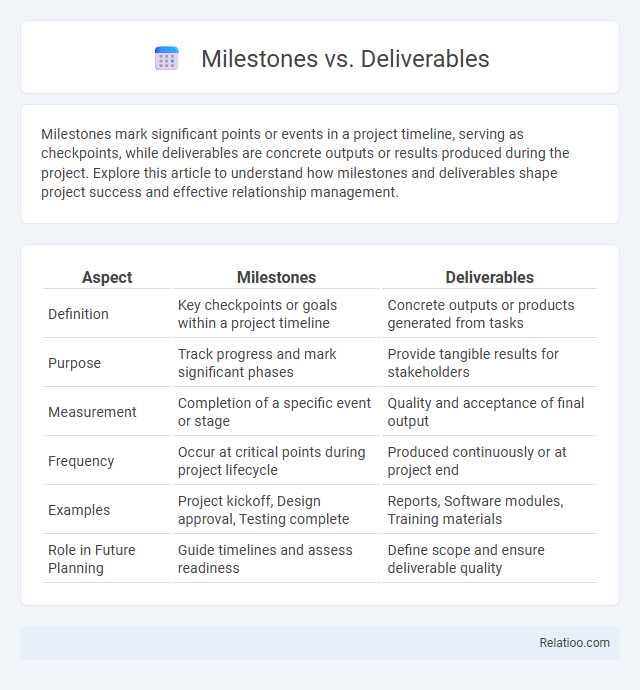Milestones mark significant points or events in a project timeline, serving as checkpoints, while deliverables are concrete outputs or results produced during the project. Explore this article to understand how milestones and deliverables shape project success and effective relationship management.
Table of Comparison
| Aspect | Milestones | Deliverables |
|---|---|---|
| Definition | Key checkpoints or goals within a project timeline | Concrete outputs or products generated from tasks |
| Purpose | Track progress and mark significant phases | Provide tangible results for stakeholders |
| Measurement | Completion of a specific event or stage | Quality and acceptance of final output |
| Frequency | Occur at critical points during project lifecycle | Produced continuously or at project end |
| Examples | Project kickoff, Design approval, Testing complete | Reports, Software modules, Training materials |
| Role in Future Planning | Guide timelines and assess readiness | Define scope and ensure deliverable quality |
Understanding Milestones and Deliverables
Milestones represent significant checkpoints in a project timeline that mark progress toward key objectives, while deliverables are tangible outputs or results produced at various stages. Understanding milestones helps you track project advancement and ensure deadlines are met, whereas deliverables demonstrate completed work that satisfies project requirements. Clear differentiation between milestones and deliverables enhances project management efficiency and accountability.
Key Differences Between Milestones and Deliverables
Milestones represent specific points or events marking significant progress in a project timeline, often indicating the completion of phases, while deliverables are tangible or measurable outputs produced during the project. Key differences between milestones and deliverables include their nature--milestones are checkpoints without physical form, whereas deliverables are concrete products or results delivered to stakeholders. Understanding these distinctions helps project managers track progress through milestones and ensure successful delivery of project objectives by managing deliverables effectively.
Importance of Milestones in Project Management
Milestones serve as critical checkpoints in project management, marking significant progress and ensuring alignment with project goals. Unlike deliverables, which are specific outputs or products, milestones represent key events or decision points that guide project timelines and facilitate stakeholder communication. The importance of milestones lies in their ability to enhance project control, track achievements, and signal readiness for subsequent phases, ultimately improving overall project success.
Role of Deliverables in Project Success
Deliverables are tangible outcomes or products produced during a project that directly contribute to achieving key milestones, which mark significant phases or achievements within the project timeline. The role of deliverables in project success is critical, as they provide measurable evidence of progress, enable stakeholders to assess quality and completeness, and ensure alignment with project objectives. Effective management and timely delivery of these deliverables drive milestone completion and ultimately determine the overall success of the project.
Setting Clear Milestones: Best Practices
Setting clear milestones involves defining specific, measurable goals that mark significant progress points within a project timeline. Differentiating milestones from deliverables is crucial; milestones signify key achievement checkpoints without necessarily producing tangible outputs, while deliverables are completed work products or services handed over to stakeholders. Best practices include aligning milestones with project objectives, ensuring milestones are time-bound and achievable, and regularly reviewing progress to adjust plans and maintain focus on critical deadlines.
Defining Measurable Deliverables
Defining measurable deliverables involves specifying clear, quantifiable outcomes that Your project must achieve to ensure progress and completion. Milestones represent key checkpoints or significant events within the project timeline, helping track overall progress, while deliverables are tangible or intangible products resulting from project activities. Understanding the distinction between milestones and deliverables enables effective project management by aligning measurable outcomes with critical deadlines.
Tracking Progress: Milestones vs Deliverables
Tracking progress effectively hinges on distinguishing milestones from deliverables, as milestones represent key checkpoints or significant events in your project timeline, while deliverables are tangible outputs or products completed at various stages. Milestones help you monitor overall project advancement and ensure critical deadlines are met, whereas deliverables provide measurable evidence of work completed. Understanding this difference allows you to better manage timelines and resource allocation for successful project execution.
Common Mistakes in Managing Milestones and Deliverables
Common mistakes in managing milestones and deliverables include confusing milestones with deliverables, where milestones represent key progress points and deliverables are tangible outputs. Failing to clearly define and differentiate these elements often leads to project delays and scope creep. Proper tracking requires setting measurable criteria for each milestone and ensuring deliverables meet quality standards before approval.
Tools for Managing Milestones and Deliverables
Project management tools like Microsoft Project, Asana, and Trello enable teams to effectively track milestones and deliverables by providing visual timelines and task dependencies. These platforms facilitate progress monitoring, deadline adherence, and resource allocation, ensuring key project objectives are met timely. Integration with collaboration features enhances communication, streamlining the management of both milestones and deliverables throughout the project lifecycle.
Integrating Milestones and Deliverables for Seamless Project Execution
Integrating milestones and deliverables ensures seamless project execution by clearly defining critical checkpoints and tangible outputs throughout the project timeline. Milestones represent significant phases or decision points, while deliverables are the concrete products or results required at each stage. Aligning Your deliverables with corresponding milestones enhances tracking, accountability, and efficient resource allocation.

Infographic: Milestones vs Deliverables
 relatioo.com
relatioo.com